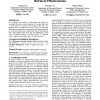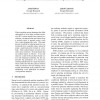29 search results - page 2 / 6 » When is Self-Training Effective for Parsing |
ACL
2011
13 years 21 days ago
2011
We investigate full-scale shortest-derivation parsing (SDP), wherein the parser selects an analysis built from the fewest number of training fragments. Shortest derivation parsing...
CIKM
2009
Springer
14 years 3 months ago
2009
Springer
We investigate the problem of determining the polarity of sentiments when one or more occurrences of a negation term such as “not” appear in a sentence. The concept of the sco...
EMNLP
2011
12 years 8 months ago
2011
When translating among languages that differ substantially in word order, machine translation (MT) systems benefit from syntactic preordering—an approach that uses features fro...
EMNLP
2010
13 years 7 months ago
2010
We introduce a novel training algorithm for unsupervised grammar induction, called Zoomed Learning. Given a training set T and a test set S, the goal of our algorithm is to identi...
JMLR
2006
13 years 9 months ago
2006
This paper proposes a general probabilistic framework for shape-based modeling and classification of waveform data. A segmental hidden Markov model (HMM) is used to characterize w...


